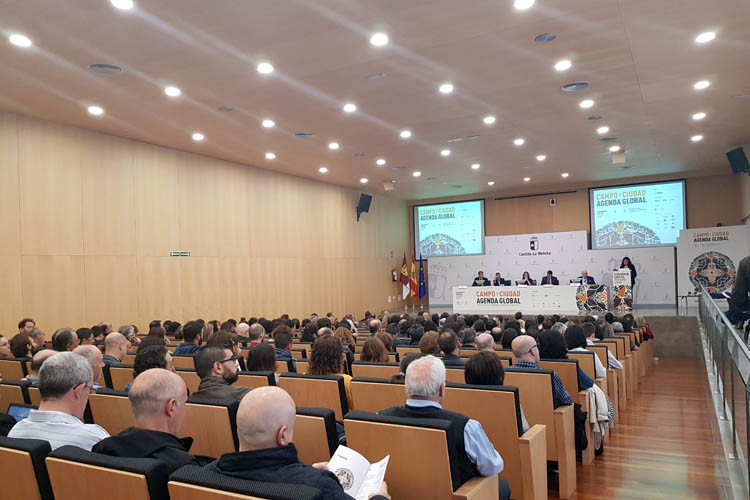Viaqua shows in the CONAMA Local of Toledo its model of circular economy

The fight against climate change, the preservation of water as a source of life, and the commitment to the circular economy through application of technology and innovation, focused the intervention of the Director of Sustainable Development the Territorial Directorate Center of Suez Spain, Laura de Vega , at the Encounter of Towns and Cities for Sustainability, organized by the CONAMA Foundation in Toledo.
Suez Spain, together with Viaqua, has presented its circular economy model in water management and how it contributes to the achievement of the 2030 Agenda objectives, an experience that the company has shared within the Meeting of Peoples and Cities by Sustainability, the forum that from the 2nd to the 4th of April celebrates the CONAMA Foundation in Toledo.
In the session on Experiences in circular economy in the field of water, Laura de Vega, showed attendees the commitments and projects of the company in terms of water preservation and fight against climate change.
Paradigm shift
"Numerous experts have warned that the water challenges that humanity will face in our century are the demographic pressure -especially in the cities- and climate change," said Laura de Vega. Challenges that will undoubtedly have an "obvious" impact, generating more frequent extreme climate situations such as severe droughts and heavy floods.
For Laura de Vega the solution to these problems is clear: the circular economy. In the company, the commitment to the circular economy "is patent", assured De Vega. "We are committed to reduce 90% of our CO2 emissions by 2021, and we do so by consuming green energy, by improving energy efficiency and producing renewable energy." "In total, we produce 15% of our total consumption," stressed the Director of Sustainable Development.
The next objective of the company is known as number six, 'preserve water as a source of life'. The data published by the United Nations warns that the demand for potable water will increase 50% before 2030, something that will lead Spain to a high level of water stress. In this context, it will be essential to have a "global vision of the water cycle", as De Vega has argued, putting Suez España's strategy in value. "We promote the reuse of water by also applying the circular economy as well as maximizing the efficiency of the supply networks", he pointed out.
Biofactory Model
One of the projects in the field of circular economy that has led the company to receive a deserved international recognition by the UN is the transformation of the different stations of wastewater treatment. "Faced with the old paradigm of linear economy, Suez proposes a new approach for wastewater treatment plants: through technology, we transform them into biofactories", explained Vega, highlighting the success story of the South Granada WWTP.
The Director of Sustainable Development has summarized the achievements made in these biofactories, "they manage to reuse 100% of the treated water for agricultural, urban, industrial and environmental uses; they value 100% of waste (sand, sludge and grease, through composting for agricultural use); and, finally, they are energy self-sufficient ". This ambitious program is carried out with actions to promote biodiversity and support the local community.
Sustainable innovation
De Vega has finished his speech talking about the innovation and creation at the end of 2018 of the mixed unit Cigat-Biofactoría, result of the consolidation of the UM CIGAT of 2015 and that aims to develop technological solutions to make effective the transition towards the economy model circular. The Xunta de Galicia collaborates in this Mixed Unit through the Galician Innovation Agency and the Water Technology Center, Cetaqua Galicia.
"It has two main research lines. The first of these is the production of high added value chemical products from the sludge and industrial wastewater treatment. And the second is the recovery of other products with high added value existing in industrial wastewater ", explained de Vega.
Those who know it well are responsible for the WWTP of Ourense, already known as the "Biofactoría Norte", where this project is being developed. In fact, they consider that "it will be positioned as a pioneer facility worldwide in the field of the biofactory". They do it step by step with this system of "obtaining high added value products based on carbon not obtained from petroleum".
"This project is at the forefront of technological innovation in the water sector," said Laura de Vega, who concluded her speech by leaving a reflection on the table: "if we want to achieve an authentic system based on circular economy, we must